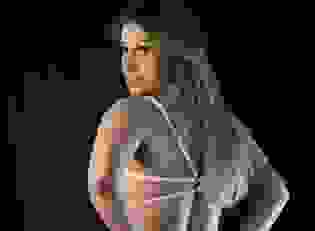- Sci-Fi & Fantasy
- Arcturus Syndrome Ch. 11
Note: You can change font size, font face, and turn on dark mode by clicking the "A" icon tab in the Story Info Box.
You can temporarily switch back to a Classic Literotica® experience during our ongoing public Beta testing. Please consider leaving feedback on issues you experience or suggest improvements.
Click hereAuthor's Note: All characters are over the age of eighteen. This is a work of fiction: any resemblance to person's living or dead is coincidence.
Recap: Dr. Emily McKinnon is the federal administrator of the Wildfire program, a small and obscure program to prepare for the scientific consequences of any first contact, including infectious diseases. Against all probability, this has come to pass, the result of a meteor strike in rural Pennsylvania. Dr. McKinnon has a team of scientists studying the mysterious infection (which causes intense erotic impulses, among other things), but is losing ground to more powerful government forces intent on eradicating this infection at any cost.
>>> Day 2 - Morning : Dr. McKinnon
Dr. Emily McKinnon, PhD, MD, and aspiring government/corporate executive made her way through two layers of soldiers, and was relieved to find that a retinal scan let her into the core research complex.
She had to ask one of the hastily-recruited staff to show her to Jeffrey's lab.
Dr. Jeffrey Kettleman, MD, renegade infectious disease specialist at Johns Hopkins, was conducting laser surgery by remote control.
McKinnon almost laughed. It looked like he was playing some kind of virtual reality game: his fingers pincering the air, his head helmeted with something out of science fiction.
She didn't interrupt, but reclined until his procedure was complete.
She admired his posture, his careful and clearly methodical motions, and his rather tight, athletic ass.
When he unstrapped the helmet, she cleared her throat.
"Oh, shit, how long have you been here?"
"The last ten minutes were the most peaceful part of the last 24 hours, or possibly the next. I didn't want to interrupt."
"Technically, they shouldn't have even let you in here, but I appreciate you not blowing my concentration. What's up?"
"Jeffrey, you called it. The bio-chem geeks are geeking hard, but they're not going to have anything valuable for weeks. Months. Possibly years."
He shrugged.
"Which is to say: you were right."
He grinned. "About wiring up the survivors? They were fucking hot, too, right?"
McKinnon shrugged. "I did not watch any of the video footage, assuming it exists, and am not sure how that benefits our analysis."
"Christ you are straight laced."
"When I think I am on tape, yes."
Kettleman glanced around the room. "What, we're...?"
"Grow up, Jeffrey. Everything is."
"Fucking hell."
"This will be counted against your permanent record," McKinnon said wryly.
He laughed, and shook his fist at the possible cameras.
"Anyway," he said. "There is video, and I didn't watch it. But their vital signs are fucking hot. I mean that in a medically exciting way, as well as a thermal energy way, as well as an indication that they were having an amazing experience. You should have all the data in our lockbox."
"I am not current with the tooling to process raw data. I'm coming to you.."
"You want the big picture."
"I want answers Jeffrey. Although I didn't dive into the data, I did spend thirty minutes talking with Katherine this morning. I realize that there were more deaths last night, but I am also observing extra-ordinary vitality among the survivors." She moved closer to him: "There are plans built into this program that could nuke Pennsylvania. We could carpetbomb four counties. If we don't have an answer, if we don't have it soon, it could happen. You've seen the headlines?"
"Nukes? Yeah. Typical tabloid rubbish."
"I don't think so. I think HomeSec has it all set up. They want an alibi. Where did a leak like that come from? HomeSec is playing the game, and they are preparing for a war crime: against our own people. My own charter practically mandates it. They've completely sidelined me, which means they don't think they need the science. This is about to become a military project."
Jeffrey leaned back on the counter behind him. In another era that would have been a bank of buttons, dials, meters, readouts. Now it was just acrylic veneer over composite supporting a laptop..
"In addition to a night of hot sex, we had three more deaths. Our survivor count is going down. I heard the President is going to speak at noon. If that's our timeline, there's nothing I can do. In fact, as a member of the human species, I'm not totally sure it's the wrong decision."
"I am."
Kettleman looked at her in surprise.
He argued: "You've seen the science: you're right that this is going to take years to understand. Tens of thousands or more new proteins, replicating by unknown mechanisms, with lethal side effects, and possibly targeted at human neurology. This might not be a russian or chinese bioweapon, but I can't tell you it's not someone's bioweapon. And what happens when they show up?"
"Did you see this?"
She reached over to his laptop and navigated into the shared data folder, brought up a spreadsheet.
"What's that?"
"Core samples. They sent in drones overnight and took core samples from pretty much every dead person in Philipsburg. It's quite a lot of samples. Dr. Rigaud wanted data, and the military provided. Initial analysis - each one of these macroproteins is significantly different than the next. The ones taken from women are about 60% larger and proportionally more complex."
She flipped to a second spreadsheet.
"These are scans from contact tracing in Eastern PA."
Kettleman squinted thoughtfully.
"Wait, what?"
"The contact tracing across the greater Philly region turned up sixty three cases of signature proteins, including a macroprotein. But these protein complexes about 30% the size of what we are baselining in Philipsburg, with no difference between men and women."
"So you're saying the infection has escaped quarantine completely, and we have developed immunity? In two days?"
McKinnon just looked at him. "I thought you were supposed to be the smart one."
Kettleman shrugged. "Usually lucky."
"From 1347 to 1351 the black death killed about half the people in europe. Bubonic, pneumonic, and septicemic plague. Bubonic had a mortality rate of about 30%; pneumonic and septicemic were almost always fatal. Bubonic was by far the most common, and caused the most deaths. This year maybe ten people world-wide will die from any of these forms. Why is that?"
"Natural selection; a disease is essentially a parasite, and if it kills it's host it deletes its own vector of transmission."
"Bingo."
"So you're saying the early mortality rate in Philipsburg represents the end of the lethal phase of this protein complex, that by natural selection it has already adapted to human conditions in a way that does not kill the host?"
"It was trial by fire for this thing, landing on a new world. And I'm not sure it's inherently parasitic."
"How so?"
"A parasite essentially consumes its host, it's just a question of how much damage it does. But the survivors? I had another conversation this morning. After being completely sidelined on the last ConCall, HomeSec and the military laying their plans, ignoring everyone else, I arranged a video feed with the survivor out in Philly. Same story as Katherine: she's radiant with health and strength, and has talked the staff into treating her like a queen."
"Quite a roll of the dice: gruesome death for 99.97% of victims, or a boost of health with completely unknown long term effects."
"Or: this thing is not naturally parasitic, but rather symbiotic."
Kettleman pursed his lips thoughtfully.
"Obviously, this is speculation, and far too much is at stake to sway the military from their course of action," she added.
He nodded. "The problem is, Emily, natural selection doesn't work this fast. Maybe if there were an intelligence at work, something consciously modifying its plan based on discovered data... but as complex as this thing is, there's no mechanism for intelligence. And we must be as strange to it as it is to us. I see where you're going, but I don't know that we can believe it. So what do we know about all the other cases in the Philly area? I presume they are all isolated and studied?"
"And probably in line for a gas chamber, if the military has its way. There are some indications of increased libido as well as beneficial impact of electrolyte supplements. But it is practically negligible compared to what we saw - and are still seeing - in Philipsburg."
Just then her priority ringtone chimed.
Dr. McKinnon held up a finger and took the call.
"Yes... yes... oh boy... interesting... get her in isolation."
She hung up. "You might like to join me on this. There was another corpse at the school but, turns out, not a corpse. A heavily salted survivor. They're transferring her to a max-isolation chamber now."
"Can we see her?"
"We're going to need to, or you are. She's at death's door and needs help. Let's go."
As they crossed the compound, McKinnon asked: "So what were you working on before I showed up? Looked like surgery."
"I was looking for commonalities in the corpses they brought in last night."
"Find any?"
Kettleman looked like he was weighing the benefits of telling her.
"That macroprotein... it is at the center of a network of filaments that mirror most physiological structures."
"Filaments?"
"Threads of loosely bonded proteins. They most densely interpenetrate the neural tissue, but thread their way along vascular and lymphatic systems as well."
"Meaning?"
"Meaning... it's in all our business."
* * *
"I thought you said she was at death's door?"
Dr. McKinnon and Dr. Kettleman stood behind triple paned glass, observing the negative-pressure containment module. The young woman inside had a hospital gown on. She sat on the edge of a low bed. She radiated health. Her skin had a dusky glow to it.
"Christ, she's gorgeous," Kettleman said.
The hospital gown was not doing her figure any favors, but her dark hair and luminous blue eyes were a stunning combination.
The military nurse explained: "They scooped her up in our standard quarantine corpse-capsule. These are hermetically sealed so they can be safely processed into sterile triple-barriered examination chambers. But they also have some sensors, and about five minutes into the trip here, a sensor tripped off: change in O2 levels inconsistent with decomposition. She was breathing. There was enough air in there for maybe ten uncomfortable minutes. There was nothing the pilot could do, and we weren't positive ourselves, but we deposited the capsule in here, went through the sealing and decontamination sequence, and out she popped. We have only communicated with her to guide her to the hospital gown and explain the situation minimally. We are not well set up for this."
Kettleman said: "So they thought she was dead; and she definitely should be dead given the conditions of transit."
"Correct, doctor."
"And here she is, looking like this."
"It's a mystery, alright. We've got a new electrolyte solution, more mineral intensive, and she has been sucking that stuff down. But what should we do with her?"
"We are going to examine absolutely everything about this woman. I am going to need to be able to get her into an MRI, and we're going to need samples of everything."
"I don't know how we can do that and keep quarantine."
McKinnon said: "We'll get folks on that, not your responsibility. Well done getting her this far. Can we talk to her?"
"Yes, the button there opens a channel. The glass is mirrored, but you can release polarity with that button there. So far she hasn't seen any of us."
"Thank you. You can go."
To Kettleman: "Let's find out what's going on in there." McKinnon opened the channel as the nurse left. She also toggled off the mirrorglass.
"Hello. I am Dr. Emily McKinnon, and this is Dr. Jeffrey Kettleman. We are working on the cure for all this. We are glad to see you alive and looking healthy."
"Oh, oh hi! I'm Vicky. Vicky Gartner. Where am I? How did I get here?"
"You're here at our command center. They flew you here, under the mistaken impression you were dead. You had the salt crystals, and apparently looked quite dead."
"Oh you're that doctor that Melissa talks to?"
"That's me. Can you tell us what happened?"
"Sure. That bitch had one of her minions rape me. I think she was trying to kill me. She wanted me out of the picture. I dared to question her at the meeting."
McKinnon gave a concerned look to Kettleman. "Can you tell us everything about what's going on inside the school?"
"First, can you tell me what the fuck is going on?"
* * *
Forty minutes later, Dr's McKinnon and Kettleman returned to his lab.
McKinnon said: "Whatever doesn't kill you makes you stronger. I've always hated that phrase. But in this case, I think it is literally true."
Kettleman had been quiet. Thoughtful. He had only asked Vicky a few questions.
Now he nodded.
"This doesn't change the game, though," he said. "You may be right; there may be some accelerated natural selection or rapid adaptation happening. But what's going on in that school? It's Lord of the Flies stuff."
"Except the children are completely unaffected."
"Only the over-eighteen's," Kettleman agreed. "Which is biologically extremely weird. There is no developmental inflection point that would explain that."
"You saw Vicky, how can you say this is not a game changer? She had an intensity to her. I know you felt it."
"But I don't understand it... and it is clearly dangerous. Even if it is on a trajectory of symbiotic adaptation, how many more would die before it reached equilibrium. Could we take that risk? But... there's this additional matter of influence. The societal ramifications of that might be more dangerous than the medical issue. We've seen it in the outside survivors. Thorvald is basically a plaything for those women. Happy as he may be, it's not normal."
"If nothing else, please think about those children. Healthy, scared, unaffected by this disease. With only a couple dozen infected people left in that town, are we really going to sacrifice all those children? There has to be another way."
McKinnon moved close to Dr. Kettleman. She rested her hand on his arm, looked deeply into his hazel eyes. "Jeffrey: I need you to understand this thing. Work with the other scientists, I'll get you anything you need. They are going to be obsessed with protein folding. I need you to understand the meaning of it all. Get that Vicky in whatever machines you need. Understand. We are on a very, very tight deadline. I am going to work the politics of it."
He nodded skeptically.
"Seriously, Jeffrey. This could be the most important thing you ever do."
* * *
A thought had crystallized in McKinnon's mind. A week ago, she had been an obscure but ambitious functionary in a fringe scientific program that probably should have been axed years ago. Then, for a moment, she had been in the spotlight. She had enjoyed it. She had been good at it. But now the traditional power structures reasserted themselves.
She saw the path forward. But first, she needed to make one more call.
"Melissa: this is Dr. McKinnon. I apologize for my availability over the past few days. Yes, we are in a scramble to solve this problem and get you out of there, but I'm going to be completely transparent. I'm not a religious person. I never have been. You and I don't really share a worldview or the language to truly understand each other. No, please listen for a moment. Because I realize that I am wrong. Maybe about God, who knows, how can we know. But more importantly, I have been wrong about you. You are have taken the lead in protecting the children and organizing the rescue efforts in Philipsburg. You have accomplished miracles. But now, everything is on the line. This thing, this affliction has scared the government, Melissa. They could... do something drastic. I need to prevent that, and to prevent that, I need to understand some things. I have some questions for you. In your own words, religious words if that's how you are experiencing it, I need you to tell me every detail of what you have experienced, what's going on in the school. I need to know everything. This is not just about medical data. I need to know your interpretation, your thoughts, your feelings, everything. I know we haven't been friendly, but I need you to know that right now, you and I are on the same side. We are trying to prevent a terrible, terrible thing from happening."
It took coaxing, questioning, and a little bit of threatening. Even so, McKinnon could tell that Melissa was holding back and telling less than the full truth. But she got enough. Enough to make her decision.
* * *
She had always known this would be the end of her career. There was no way this was ever going to be on her resume. She would be as radioactive as Marie Curie. So, like Madame Curie, McKinnon was going to put it all on the line.
A handprint. A retinal scan. A voice recognition check. A badge. And she was in.
The digital trail could not be brighter.
She was in the sanctum sanctorum: the BSL-4 complex.
This was not the bubbling beakers and elaborate tubing of science fiction labs: this was row upon row of cabinets, each containing specific equipment, each protected by redundant layers of security to prevent molecular transmission. Centrifuges. Refrigerators. Electron microscopes. Reaction chambers. All in cabinets.
And then there was the suit room. McKinnon knew the protocol and suited up. Her presence was noted, but without much remark. Her scientists were hard at work on their nobel prizes, and if the head of the program wanted to enter the suit room, that was her choice.
She sealed everything, and then used voice override in her sterile suit to disable the alarm monitoring.
Ten minutes later she was through the decontamination airlock. Even here, the corpses and the salt crystals were sealed away. She used her badge to open one of the bins of mineral salts. According to the reports, these were incredibly rich in the alien proteins. Each bin represented a distinct source, all precisely labeled. She was gambling on efficiency, and was happily rewarded: "Victoria Gartner."
She reached in and scooped out about a cup of the crystals that had been removed from her not-quite-a-corpse. She dumped this into a secure transport container, but did not activate the magnetic lock. Locking it would enter it into the tracking system. Instead, she simply snapped it shut.
Twenty minutes later she was back in her own office, stirring alien salt crystals into a glass of water. She didn't let herself think about it. She ignored all phone calls.
It was salty. Really, really salty. And had a strange, acrid aftertaste. It was an act of will to dissolve the salts and drink it down. It took a few glasses of water to get it done.
But it was done. Dr. Emily McKinnon had intentionally, wilfully broken quarantine and put herself, the command center, and the world at risk.
She offered a prayer to all those doctors who had experimented on themselves, known that many had died gruesome deaths, and some had set back the course of progress for decades with their foolishness.
And then she put everything away, flipped open her laptop, and got back to work.
* * *
It was the last ConCall before the President's address to the nation.
Glenn from HomeSec was leading now.
"General Buckley: we have eyes on your runner. They're on their way south, well past your quarantine zone."








